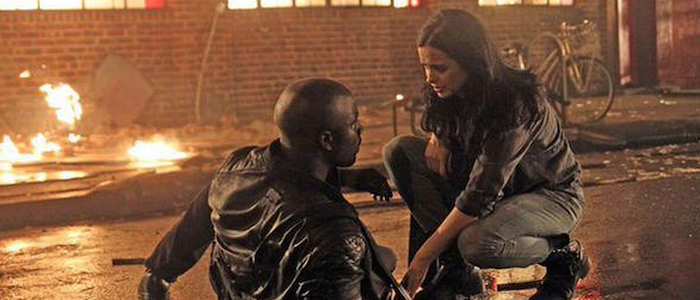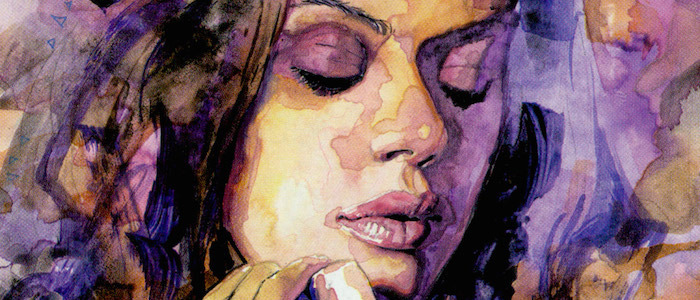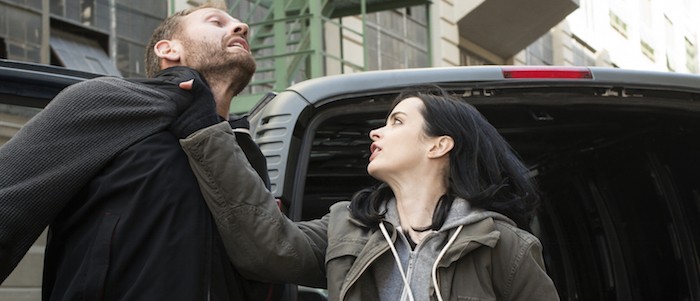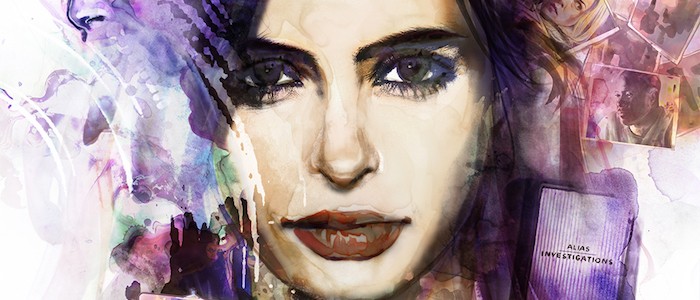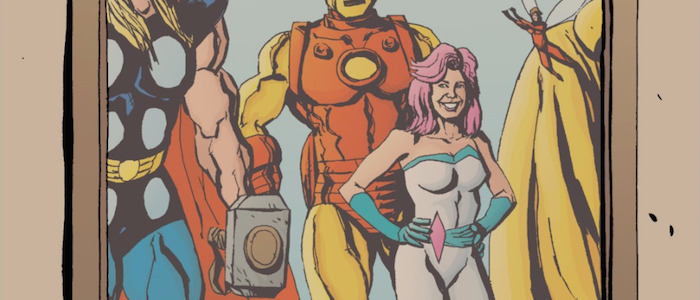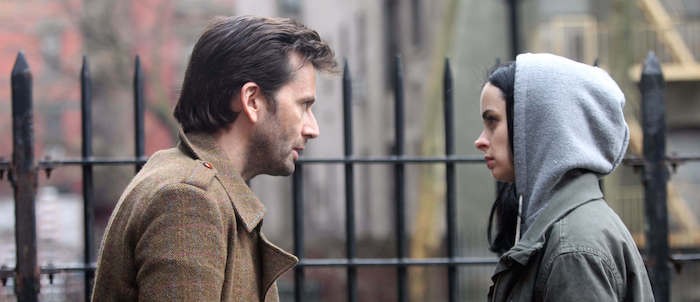'Jessica Jones' Vs. 'Alias': How Marvel's New Netflix Series Compares To The Comic That Inspired It
Jessica Jones, Marvel Studios' second outing into the world of streaming television, is a triumph. More consistently paced than Daredevil and more confidently produced than Agents of S.H.I.E.L.D., it's easily the best small-screen Marvel story yet. Not bad for a character the average non-geek knows nothing about.
Although she has since become a major player in the larger Marvel comic book universe, the character of Jessica Jones originated in the pages of Alias, a wonderful 28-issue series from writer Brian Michael Bendis and artist Michael Gaydos. The basic template is the same: Jessica was a superhero, bad stuff happened, and now she's private investigator. Alias was a Marvel "Max" title, an offshoot that publishes frequently non-canonical stories starring Marvel characters for adult readers, but it has been absorbed into the larger Marvel world. The events of the series are now canon, by and large, and Jessica Jones is one of the best and most vital new Marvel characters of the past two decades.
While Jessica Jones borrows the set-up from Alias, much changed on the road to Netflix. The comic's climactic arc became the show's first season. Characters were radically changed, while others were dropped altogether. The differences between the Marvel Cinematic Universe and the Marvel comics universe demanded modifications in tone and story. In the interest of pure, geeky curiosity, I spent the week before the premiere of Jessica Jones revisiting Alias, and the weekend of its release watching all 13 episodes for one reason only: to compare the two, and see where they connect and diverge.
This post contains SPOILERS for all of Alias and all of Jessica Jones. If you have an interest in either and aren't caught up, please bookmark this article and come back later.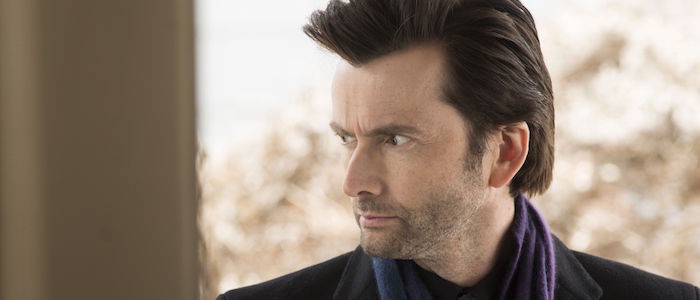
Jessica Jones and Her Archenemy
In both her Netflix and comic book incarnations, Jessica Jones is abducted and held captive by a supervillain with the ability to command anyone to do whatever he says. In both cases, Jessica is traumatized by her months spent as a mind-controlled slave and battles psychological scars and a drinking problem brought on by PTSD.
The similarities mostly end there. In the comics, this villain is Zebediah Killgrave a.k.a. the Purple Man, a sadistic mass murderer whose history with Jessica and his later attempt at revenge is the subject of a single story arc. On Netflix, this villain is Kilgrave (only one "L" and no first name), a more subtle, more quietly terrifying psychopath who has traded in his comic book counterpart's purple skin for a purple wardrobe. In his transition to television, Kilgrave has also picked up a few layers. While the on-paper of this version is terrifying and has been the subject of more than his fair share of great comic storylines, David Tennant transforms him into something far more pathetic and compelling. Kilgrave's obsession with Jessica is less that of a bad guy wanting to hurt a good guy, and more that of jilted ex-boyfriend refusing to move on after a bad break-up.
Tennant plays Kilgrave as an unfeeling, calculated little boy. His powers have given him everything he could ever want, so he aggressively pursues the things he cannot have. His selfishness, his petty plan to hurt the girl who hurt him, is more personal and terrifying than his actions in the pages of Alias. Hell, he's the best villain in the entire MCU so far.
Jessica Jones and Luke Cage
In Alias, Jessica Jones and fellow street-level superhero Luke Cage are already hooking up when the story begins. They are well aware of each other's reputations and have no qualms about sharing a bed on occasion. Since Luke is a long-established Marvel character, this is the right choice. It's only in the last few pages of the final issue of Alias that Jessica and Luke get serious – she's pregnant, she's keeping it, he's the father, and he couldn't be happier.
While Jessica and Luke are long-married parents by this point in the Marvel Comics world, we probably won't see them getting together permanently on screen for some time. In the TV series, Jessica is overjoyed to discover that Luke is a fellow "gifted" individual, but their passionate affair is cut short due to all kinds of plot drama (none of which is present in Alias). It's a decision that makes perfect sense. In the MCU, Luke is a new character and he's got to establish himself in the bigger picture before his relationship with Jessica can mean anything. Mike Colter, who is so very good as Luke, is currently filming his own Netflix series to debut in 2016. These two will probably follow the comic book trajectory at some point, but Jessica getting knocked up before a big wedding is probably a few years away.
Perhaps the upcoming Defenders crossover series will give them a chance to finally get together in a more serious fashion. Or not. Marvel could drag out the will-they-or-won't-they tension for years.
Jessica Jones and Her Best Friend
Jessica doesn't have many friends in any of her incarnations, but in both Alias and Jessica Jones, she has a blonde-haired best friend and confidant. On Netflix, this is Patricia "Trish" Walker (Rachael Taylor), a former child star and current radio talk show host who may eventually become the superhero Hellcat, if she follows her comic counterpart. After all, why would the series establish this enthusiastic do-gooder of a sidekick as being a capable martial artist if they weren't planning to stick her in a costume at some point? In any case, Trish is one of the best characters on the show, even though Marvel diehards will grumble that her proper comic name, Patsy, is disregarded on the show as a childhood nickname.
Trish/future Hellcat is a stand-in for Carol Danvers a.k.a. Captain Marvel who is Jessica's long-suffering buddy in Alias. However, Marvel Studios has big plans for Captain Marvel (a feature film in 2018), so she probably wasn't even an option. Promoting a wonderful C-lister like Trish/Patsy to this vital role is the kind of change we can get behind. After all, we're never going to get a Hellcat movie, so getting to see her on Jessica Jones is a great consolation prize.
In any case, Trish is the warm and effective best friend/sidekick character that Daredevil desperately needed. Trish is the anti-Foggy – everything that didn't work about Matt Murdock's best friend (acting, writing, importance to the central story) works here.
Jessica Jones and Malcolm
One of the biggest adjustments from page to screen is the character of Malcolm (Eka Darville). In Alias, he's an irritating but loyal teenager and superhero fan who hangs around Jessica's office hoping to get a job because he wants to brush shoulders with superpowered folks. In Jessica Jones, he's Jessica's junkie neighbor who turns out to be a pawn in Kilgrave's revenge scheme. Once he's cleaned up, he becomes a valuable ally. The final shot of the final episode suggests that he may follow comic Malcolm's trajectory and become Alias Investigations' in-house assistant.
In the pages of Alias, Malcolm is a little half-baked – he never feels like he matters much and the series concludes before he can make much of an impact. Plus, his superhero obsession and knowledge of the larger Marvel universe doesn't make sense in the MCU, where there are only a few established and well-known superheroes. His TV reinvention is a huge improvement and Darville's likable and quietly charming performance is a welcome component of the ensemble.
Jessica Jones and the Marvel Universe
Although Jessica Jones takes place in the Marvel Cinematic Universe that also houses the Avengers movie characters and the Daredevil Netflix series, it operates almost entirely on its own. Outside of an early subplot that deals explicitly with the psychological fallout that the "Battle of New York" from 2012's The Avengers had on certain people, Jessica Jones might as well take place in its own pocket universe. This will change as its supporting characters get spin-off shows and the Netflix end of the MCU becomes more tightly woven, but the world feels a little empty right now.
It's a bit of a shame, really. In Alias, Jessica is able to go on a date with Scott Lang (whom Paul Rudd played in this summer's Ant-Man), only to have their dinner interrupted by a battle between Spider-Man and Doc Ock. She can accept a job from J. Jonah Jameson, brush shoulders with Thor, and utilize psychic training from Jean Grey to repel Killgrave's mental assaults. In one of Alias' wildest story arcs, she was tasked with tracking down Rick Jones, the minor Marvel character who accidentally helped create the Hulk, acted as Captain America's sidekick, and fought in the Kree-Skrull War.
Jessica Jones is a very good show with more than its fair share of great moments, but it does suffer a little from not taking place in such a detailed universe that has so much history. The whole "superhero-turned-P.I." thing is a little more effective when she's one of many heroes and has willingly left that flashy life behind.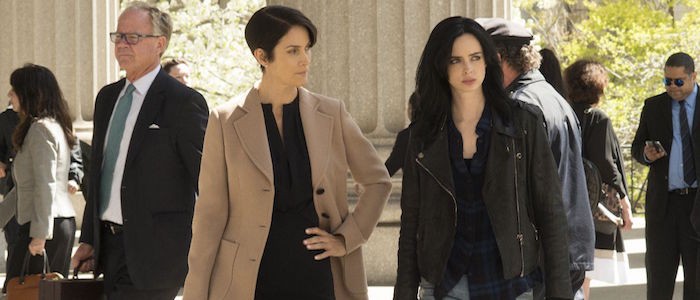
Jessica Jones and Daredevil
The closest connection Jessica Jones has to the larger MCU is its fellow Netflix series, Daredevil. Although the Devil of Hell's Kitchen doesn't actually show up in the series, his ally Claire Temple (Rosario Dawson) pops up to assist Jessica when Luke Cage is injured. Seeing Claire show up, even if it's just for a single episode, is hugely satisfying. It initially feels like a bummer that Jessica turns her down when she offers to give her powered buddy a call to help with the Kilgrave situation, but it was the right call. Jessica Jones didn't need a last-minute guest star to help save the day when it has its own great characters.
However, Matt Murdock/Daredevil plays a significant role in Alias. He's Jessica's lawyer and finds himself bailing her out of trouble on more than one occasion. In one arc, he even hires her and Luke Cage to act as bodyguards when his secret identity is compromised (their presence make him look like he can't protect himself). In the series, Matt's role is filled by sleazy big-time lawyer Jerri Hogarth (Carrie-Anne Moss), who ends up being integral to the larger plot and a compelling character in her own right. However, in future seasons, maybe Jessica will need a new lawyer and maybe she'll look for someone a little cheaper and a little closer...
Jessica Jones and Her Origin Story
The origin of Jessica Jones' powers is very simple in Alias, mirroring the clean and simplistic origins of classic heroes like Spider-Man. Her family is on a road trip, their car collides with a military transport containing an experimental something-or-other, and everyone is killed except her. Naturally, whatever was in that truck gives her powers. The end.
Jessica Jones maintains the same basic template: there's a car accident and she gains powers. However, there doesn't seem to be a military transport in the show (they hit a fairly ordinary-looking truck) and Trish uncovers a conspiracy that suggests Jessica was the subject of mysterious medical experiments while she was recovering after the accident. That subplot is a big question mark and will surely form the skeleton of season two. In any case, Jessica's powers are no longer "just another thing that happened in the Marvel universe." There's a bigger mystery going on, for better or for worse.
Jessica Jones and Her Powers
One of the most interesting aspects of Jessica as depicted in Alias is how unremarkable her powers really are. She's stronger than the average human, but most notable Marvel heroes would win an arm-wrestling tournament. She can fly, but she's less than graceful and can't land. It makes sense that she could get away with abandoning a superhero career – no one is going to miss her when the Avengers are around.
The show follows suit. Jessica's flying has been Nerfed into powerful jumping, but otherwise, Jessica's superpowers are significantly less colorful than those of any other MCU hero. But that's totally okay. Her lack of flash, the fact that her powers make her strong but not invincible, only make her all the more vulnerable and interesting. Knowing that she can't Hulk her way out a big fight scene keeps the stakes right where they need to be.
Jessica Jones and Her Superhero Career
There aren't too many costumed vigilantes wandering the MCU right now. Daredevil is new on the scene and Spider-Man is around the corner, but the only major, known heroes are the Avengers, who operate mostly in the public eye. So it would have been impossible for Jessica Jones to recreate Jessica's superhero career as seen in Alias. It may have been short-lived, but it involved her getting in a costume, giving herself a hero name (Jewel) and flying around the city protecting the innocent and fighting crime. Jessica is a fascinating character in the larger Marvel comic universe because of how unremarkable her superhero career is. Meanwhile, any superhero career in the current MCU would still be completely and totally remarkable.
So the show adjusts the timeline. Jessica's vigilante career comes to an end almost instantly. She stops a single mugging, gets taken by Kilgrave, and that's that. The result is something far more nihilistic. Why help people at all when this is what happens to you? TV Jessica is a far darker and more self-destructive person and her even briefer hero career feeds into that.
Jessica Jones and Her Bad Habits
In Alias, Jessica is mess, but she's a controlled mess. She drinks too much. She sleeps around with strange men. She gets into trouble of the personal and professional varieties. She's flawed, but she has her act together. You get the impression that she pays her rent on time, even though crushing pain and trauma are always lurking at the fringes of her everyday existence.
Netflix Jessica is a disaster zone. Her apartment and office are continuously trashed, she gets thrown out of bars into literal piles of garbage, and she might as well have vomit stains all over that badass leather jacket. It's definitely a big adjustment for those who know the source material. When you compare both iterations of the character side-by-side, the live-action version is the one veering toward the cartoonish.
However, it's a testament to the Jessica Jones crew and Krysten Ritter's performance that TV Jessica never feels like a joke. Her pain is all too real, her psychic wounds deep and painful. It helps that the series devotes an episode to her life prior to Kilgrave. Seeing the admittedly sarcastic and slightly maladjusted Jessica before she was fundamentally damaged makes her story all the more heartbreaking. If Alias is about a woman dealing with the scars of trauma, than Jessica Jones is about a woman dealing with open wounds.

